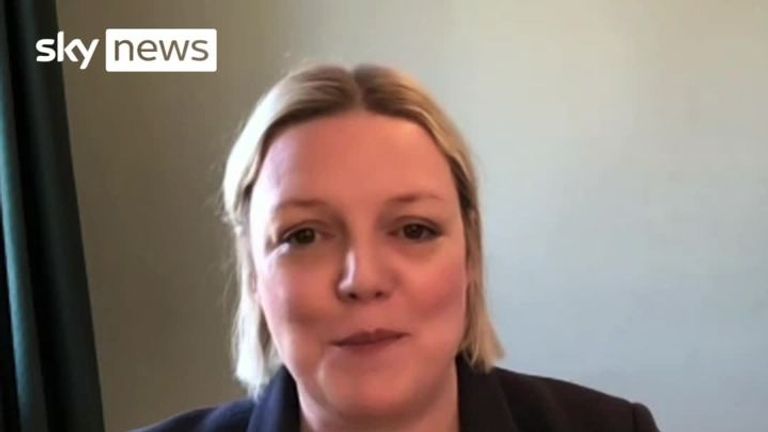COVID-19: Why the decision over whether to act to bring down coronavirus cases is a political one
There are political questions which only ministers can answer. The scientists lay out the options. They must decide which ones to take. So, to a lesser extent, must we all.
Friday 22 October 2021 16:20, UK
Although many aspects of this pandemic have changed in the last 22 months, some truths endure. A government that wants to bring the number of cases down has to act earlier, harder and at a wider scale than its leaders find comfortable.
This is the message that scientists watching the rise in COVID-19 cases have given to ministers in England. Now they face a decision: do they want to bring case numbers down at all?
The fact that this question is worth asking at all shows the way in which things have changed since this time last year. The vaccine has weakened, although not broken, the link between cases and severe or fatal illness.
It therefore becomes possible to believe that even very high winter case rates will not overload the NHS, the key trigger for any government action.
The latest epidemiological analysis from the Scientific Advisory Group for Emergencies suggests that it is "increasingly unlikely" that hospital admissions will go above the levels seen in January 2021 even if the government does not reintroduce any more restrictions.
But, as ever, this projection is fraught with uncertainty.
First, there is the question of behaviour. Have people given up caring about the virus, or will they spontaneously reduce their contacts as cases rise? Predicting this is a bit like trying to predict the British weather - and in fact the weather could play a key role, because colder temperatures push people inside, where they are more likely to contract the virus.
The second question concerns immunity. Scientists know that it wanes, but they are not sure how fast and how far. The fear is that immunity will fall off rapidly just at the moment when cases surge in winter, producing what virologists call "a perfect pandemic storm".
The prospect of this worst-case scenario means that the booster vaccination programme is going to be crucial in holding back the virus; here the twin questions of behaviour and immunity come together. Now that cases are rising, will older and more vulnerable people rush to get their booster jabs, or will slow rates of uptake continue? Of all the uncertainties surrounding the decision on restrictions, the issue of boosters is perhaps the biggest.
Of course, in an ideal world ministers would be able to wait and see what happens before making up their minds. Unfortunately, viruses don't work like that. If they want to restrain COVID, they need to act ahead of time.
If they did decide to do this, they could do so without too much disruption, because the high levels of immunity in the population mean that it is possible to slow the spread of the virus without a full lockdown.
The government's Plan B has three main measures: mask-wearing, vaccine passports and working from home. Of these, the scientists say, working from home would have the biggest effect. Simply introducing that could reduce case rates.
Asking people to work from home would have a secondary benefit: it would reduce the levels of other infectious diseases. These have been spreading like wildfire since lockdown was released, as anyone with young children can testify.
Outbreaks of diseases such as flu and RSV may increase the risk from COVID: the effect of what is known as coinfection is still not fully understood. They may also place additional pressure on the NHS just at the moment when it is feeling the strain from the rise in coronavirus cases.
It is worth remembering that the apparently comforting modelling suggesting that cases will not exceed the levels of January 2021 only refers to COVID, and that last winter almost all infectious diseases had been thoroughly suppressed by lockdown. Flu almost vanished. This winter that will not be the case. The consequences for the NHS could be severe.
Or they might not: we just don't know. Perhaps the flu vaccine will hold back flu. Perhaps the measures we take against COVID, like testing and isolation, will also stem the spread of other viruses. Perhaps - and it seems as if this is the Prime Minister's hope - the NHS will be able to bear the strain.
The wider question is whether that is enough. Are we comfortable using the collapse of the NHS as the trigger point for action? Do we dislike restrictions so much that we are willing to bear hundreds or thousands of deaths a week as the very literal the cost of doing business?
These are political questions which only ministers can answer. The scientists lay out the options. They must decide which ones to take. So, to a lesser extent, must we all.
There is one further scientific warning that might factor in to our decisions: the prospect of a new, more transmissible variant. There is no firm evidence that one exists, but it is theoretically possible that one could emerge.
If it arrives at a moment when we are already under strain, that would be bad news - and of course having high case numbers means we are more likely to generate one.
Scientists advising the government anticipate that at some point a new variant will come along that spreads faster than Delta, but they do not know when this will happen.
Even after all this time, there is so much we do not know about coronavirus. To act in the midst of this immense uncertainty requires a political choice - that is why leadership matters. Over to you, Mr Johnson.










